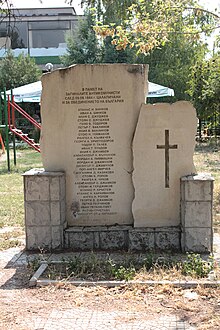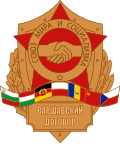
Back Гаранскі рух Byelorussian Горянско движение Bulgarian Горјанско движење Macedonian Горянское движение Russian Покрет Горјани Serbian Горянський рух Ukrainian
This article needs additional citations for verification. (January 2010) |
| Goryani movement | |||||||
|---|---|---|---|---|---|---|---|
| Part of anti-communist insurgencies in Central and Eastern Europe | |||||||
 Monument of the perished anticommunists in Tsalapitsa | |||||||
| |||||||
| Belligerents | |||||||
|
| Goryani rebels | ||||||
| Commanders and leaders | |||||||
|
| No centralized leadership | ||||||
| Eastern Bloc |
|---|
 |
The Goryani movement (Bulgarian: Горянско движение) or Goryanstvo (Bulgarian: горянство: Goryanism) was an active guerrilla resistance against the Soviet-aligned People's Republic of Bulgaria. It began immediately after the Ninth of September coup d'état in 1944 which opened the way to communist rule in Bulgaria, and ended in 1956. The movement covered the entire country, including urban areas and is known to have been the first organised anti-Soviet armed resistance in eastern Europe as well as the longest lasting.
The members of the movement were dubbed Goryani (Bulgarian: Горяни: ones of the forest), most likely not by themselves but pejoratively by the authorities or by street wits. Extremely scant official acknowledgements of the movement termed its members diversanti (Bulgarian: диверсанти: subversives, saboteurs and invariably stressed that they had been sent across the border by "imperialist centres".) Though helped to a significant extent by emigre Bulgarians and by foreign powers, the Goryani movement was mostly indigenous and spontaneous.
Its mode of action was traditionally Bulgarian, as practiced by the anti-Ottoman hayduti [Bulgarian хайдути: outlaws] and the anti-Nazi Partisans (pejoratively called Shumkari; Bulgarian: Шумкари, those of the bushes): the Goryani hid in remote mountains, highlands and forests, relying on a large network of yatatsi (Bulgarian: ятаци; illicit helpers) in settled communities, conducted sudden armed raids to disturb official business and withdrew before capture. Largely composed of country folk who defended their land and property from the communists, the Goryani had no discernible ideology or platform and were united by their dislike of the communist authorities.
Very little information has survived on the Goryani, whose existence was steadfastly concealed and denied by the Bulgarian communist authorities, with historical data on them carefully classified and removed and witnesses or participants intimidated into silence or eliminated. Since the movement was practically devoid of any international dimension, its history has remained remote from the mainstream of world anti-communist resistance.